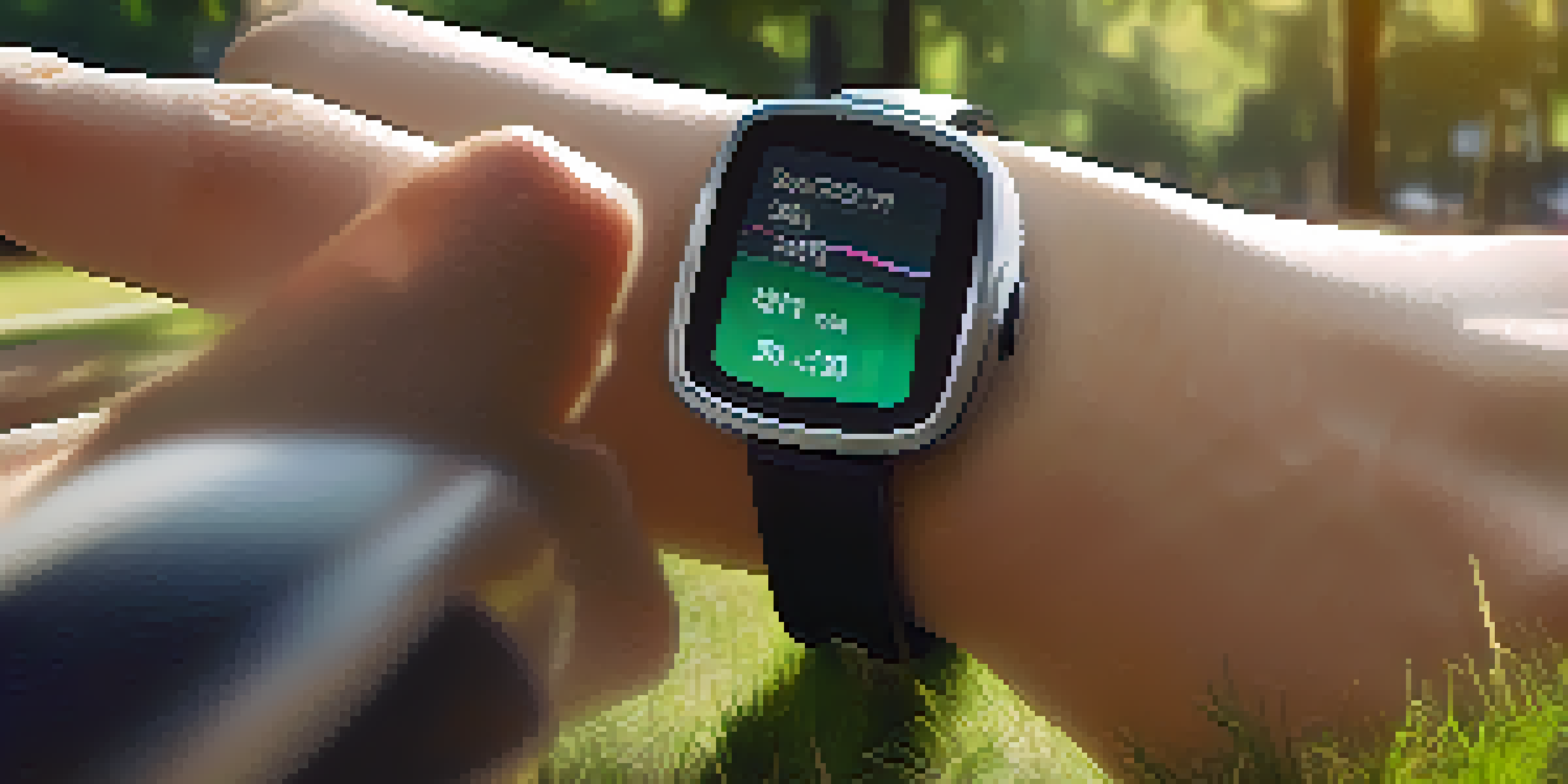Wearable Tech: Balancing Innovation and Ethical Concerns

Understanding Wearable Technology: A Brief Overview
Wearable technology encompasses devices like smartwatches, fitness trackers, and augmented reality glasses. These gadgets have revolutionized how we track our health, stay connected, and interact with the world around us. As they become more prevalent in our daily lives, understanding their capabilities and limitations is crucial. This overview sets the stage for exploring the innovative benefits and ethical dilemmas they present.
Wearable technology is a powerful tool, but it must be used responsibly to ensure it enhances our lives rather than complicates them.
The convenience of wearable tech is undeniable; it offers real-time data about our health and lifestyle. For instance, a fitness tracker can monitor your heart rate, steps taken, and even sleep patterns, providing insights that can motivate healthier habits. However, the more we rely on these devices, the more we must consider the implications of their use. As we delve deeper, we must ask ourselves: what are the costs of this convenience?
Moreover, wearable technology is continuously evolving, incorporating advanced features like health monitoring and GPS tracking. This innovation raises exciting possibilities for personal health management and connectivity. But as we embrace these advancements, it’s essential to remain aware of the ethical questions surrounding data privacy and user consent.
The Innovations Driving Wearable Technology Forward
Recent innovations in wearable tech have made significant strides, especially in health monitoring. Devices now can detect irregular heartbeats or track blood oxygen levels, providing users with vital health information at their fingertips. This capability has the potential to save lives by alerting users to seek medical attention when necessary. Such advancements highlight the positive impacts of wearable tech, particularly in preventive healthcare.

In addition to health, wearables are transforming the way we interact with our surroundings. Augmented reality glasses, for example, can overlay digital information onto the physical world, enhancing experiences in fields like gaming and education. This seamless blend of real and virtual elements not only enriches user interaction but also opens new avenues for learning and exploration.
Wearable Tech Empowers Health
Wearable devices enable users to monitor their health, fostering healthier habits and facilitating real-time health management.
However, with these innovations come questions about accessibility and inclusivity. Not everyone has the means to invest in the latest devices, which can create a digital divide. As we celebrate these technological advancements, it’s vital to ensure that they are accessible to all, fostering an environment where everyone can benefit from the innovations of wearable tech.
Ethical Concerns: Privacy and Data Security Issues
As wearable technology collects vast amounts of personal data, privacy concerns have emerged as a significant ethical issue. Users often share sensitive information, from health metrics to location data, raising questions about who has access to this data and how it’s used. For instance, many wearable devices sync with apps that may not have robust security measures, putting user data at risk.
The greatest challenge of wearable technology is not the technology itself, but the ethical implications of its use.
Furthermore, the potential for misuse of data poses a serious threat. Imagine if health insurance companies accessed your fitness data; they might use it to determine your premiums based on your activity levels. This scenario highlights the importance of clear data protection policies and user consent agreements, which should be transparent and easy to understand.
Addressing these privacy concerns requires a collective effort from manufacturers, consumers, and regulators. As users, we must advocate for our rights and understand the implications of the data we share. At the same time, companies must prioritize ethical data practices, ensuring that user privacy is respected and protected.
The Impact of Wearable Tech on Health and Wellness
Wearable technology has a profound impact on health and wellness, enabling users to take charge of their health like never before. For instance, fitness trackers can motivate users to reach their daily activity goals, fostering healthier habits. This empowerment can lead to improved physical health and overall well-being, showcasing the positive potential of these devices.
Additionally, wearables can facilitate remote health monitoring, allowing healthcare providers to track patients' conditions in real-time. This capability is especially beneficial for chronic illness management, where timely interventions can make a significant difference. By bridging the gap between patients and healthcare professionals, wearable devices enhance the quality of care.
Privacy Concerns Are Rising
The extensive data collected by wearables raises significant privacy issues, highlighting the need for transparent data protection policies.
However, it’s essential to recognize that reliance on technology should not replace professional medical advice. While wearables provide valuable information, they are not substitutes for regular check-ups and consultations. Striking a balance between using technology and engaging with healthcare providers is crucial for maintaining optimal health.
Wearable Tech and Mental Health: A Double-Edged Sword
While wearable technology has the potential to support mental health, it can also contribute to anxiety and stress. For some users, constant monitoring of metrics like heart rate or sleep patterns can lead to obsessive behaviors. This obsession can create unnecessary pressure to meet unrealistic health goals, ultimately impacting mental well-being.
On the flip side, wearables can offer valuable tools for managing mental health. Apps associated with devices often include features for mindfulness, meditation, and stress tracking. These resources can help users cultivate healthier habits and improve their emotional resilience, showcasing the positive aspects of wearables in mental health management.
The key lies in using technology mindfully. Users should be aware of their motivations for using wearables and set boundaries to avoid falling into the trap of constant self-surveillance. Balancing the benefits of technology with self-care practices can enhance mental health and well-being.
Future Trends: The Next Frontier in Wearable Tech
Looking ahead, the future of wearable technology promises even more exciting developments. Innovations in materials science may lead to flexible, skin-like devices that are less intrusive and more comfortable to wear. Imagine devices that blend seamlessly into our daily lives, providing health insights without being a distraction—a game changer for user experience.
Moreover, the integration of artificial intelligence (AI) could enhance the functionality of wearables. AI can analyze data trends and provide personalized recommendations, making health management more intuitive. For example, a smartwatch might suggest exercise routines based on your activity history and current health metrics, tailoring your fitness journey to your specific needs.
Future Innovations Await
Advancements in wearable technology, including AI integration, promise more personalized health insights while necessitating careful ethical considerations.
However, as we embrace these advancements, it’s crucial to remain vigilant about ethical considerations. The potential for increased data collection and surveillance must be balanced with robust privacy protections. As technology evolves, so too must our commitment to ensuring that innovation aligns with ethical practices.
Conclusion: Striking a Balance in Wearable Technology
In conclusion, wearable technology represents a fascinating intersection of innovation and ethics. As we navigate the benefits and challenges of these devices, it’s vital to maintain a clear dialogue about privacy, data security, and mental health. By fostering awareness and advocacy, we can ensure that wearable tech serves as a tool for empowerment rather than a source of anxiety.
Ultimately, the future of wearable technology holds immense potential for enhancing our lives, but it requires careful consideration of ethical implications. As consumers, we must remain informed and proactive in our engagement with these devices. Only then can we strike a balance that maximizes the benefits while minimizing the risks.

As we move forward in this digital age, let us embrace innovation while prioritizing our values and well-being. By doing so, we can create a future where wearable technology genuinely enhances our lives without compromising our ethical standards.